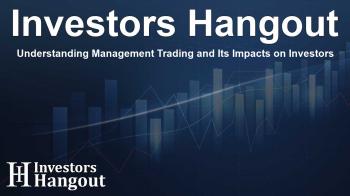Understanding Management Trading and Its Impacts on Investors

Understanding Management Trading and Its Impacts on Investors
When it comes to stock markets, insider trading has always captivated the attention of analysts and investors alike. A significant aspect of this is the trading activities influenced by management and their close associates. Understanding these dynamics is crucial for investors who want to make informed decisions in their investment strategies. In this article, we will delve into the essence of management trading and explore its potential impacts on the market.
What is Management Trading?
Management trading refers to the buying and selling of a company’s shares by its executives or close relations. This trading is closely monitored since insiders often have access to non-public information that could influence stock prices. As such, any significant trading activity by executives can signal their confidence or concerns about the company’s future performance, affecting investor sentiment.
Insights from Executives
When executives buy their company's stock, it typically indicates a strong belief in the organization's growth potential. Investors often see this as a positive signal, leading them to buy shares, which can result in an increase in stock prices. Conversely, when management sells a significant portion of their shares, it might raise red flags among investors, prompting them to question the company's stability and future trajectory.
Legal Framework Surrounding Insider Trading
It's crucial to note that not all insider trading is illegal. In many jurisdictions, executives are permitted to buy and sell shares, as long as they report their trades to regulatory authorities. In the United States, for instance, the Securities and Exchange Commission (SEC) requires that insiders file reports every time they purchase or sell shares of their own company. This transparency aims to protect investors from potential abuse of insider knowledge.
Strategies for Investors
For prudent investors, keeping an eye on the trading activities of company management can provide valuable insights into the health of the company. Some investors may even develop strategies based on these trading patterns. For example, a substantial purchase of shares by executives could prompt an investor to increase their own holdings in that company. Meanwhile, significant sell-offs might lead to a reassessment of their investments.
The Role of Market Sentiment
Market sentiment plays a pivotal role in the reactions of investors to management trading. Positive sentiment can amplify the benefits of insider buying, propelling stock prices higher and encouraging more investment. Conversely, negative sentiment can exacerbate the effects of insider selling, leading to declines in stock price and potential losses for shareholders. Understanding the market environment is essential when interpreting these trades.
Enhancing Due Diligence
Investors must combine insights from management trading with other due diligence measures. Analyzing the company’s fundamentals, market conditions, and industry trends can provide a more holistic view and mitigate risks. It is essential to remember that insider trading is just one aspect of investment analysis and should not be the sole basis for making investment decisions.
Conclusion: The Bigger Picture
In conclusion, while management trading can provide significant insights into a company’s health and future prospects, it must be viewed in the larger context of market variables and company performance. Monitoring the buy-sell patterns of executives like those at Australian Oilseeds Holdings Limited (NASDAQ: COOT) is essential for investors seeking to navigate the complexities of stock trading. Through vigilance and a comprehensive investment approach, investors can make more informed choices.
Frequently Asked Questions
What does management trading mean?
Management trading refers to the buying and selling of a company’s shares by its executives or closely related individuals who have access to insider information.
Why do investors care about management trading?
Investors pay attention to management trading because it can provide insights into the executives' confidence in the company's future performance.
Is all insider trading illegal?
No, not all insider trading is illegal. Executives can legally trade shares and must report these transactions to regulatory authorities.
How can management trading impact stock prices?
Significant buying by executives can boost stock prices as it signals confidence, while substantial selling can lead to declines as it raises concerns among investors.
What other factors should investors consider alongside management trading?
Investors should consider company fundamentals, market conditions, and broader economic trends to get a full picture of potential investments.
About The Author
Contact Kelly Martin privately here. Or send an email with ATTN: Kelly Martin as the subject to contact@investorshangout.com.
About Investors Hangout
Investors Hangout is a leading online stock forum for financial discussion and learning, offering a wide range of free tools and resources. It draws in traders of all levels, who exchange market knowledge, investigate trading tactics, and keep an eye on industry developments in real time. Featuring financial articles, stock message boards, quotes, charts, company profiles, and live news updates. Through cooperative learning and a wealth of informational resources, it helps users from novices creating their first portfolios to experts honing their techniques. Join Investors Hangout today: https://investorshangout.com/
The content of this article is based on factual, publicly available information and does not represent legal, financial, or investment advice. Investors Hangout does not offer financial advice, and the author is not a licensed financial advisor. Consult a qualified advisor before making any financial or investment decisions based on this article. This article should not be considered advice to purchase, sell, or hold any securities or other investments. If any of the material provided here is inaccurate, please contact us for corrections.

